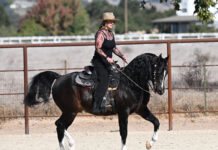SPILLERS® presented its world-leading collaborative research on the care of senior horses at the Australasian Equine Science Society’s Science Symposium earlier this month. Professor Pat Harris, head of the WALTHAM® Equine Studies Group, which underpins the science behind the SPILLERS® brand, was one of the invited speakers at this biennial international event.
As the proportion of aged horses within the general equine population appears to be increasing in many countries there is growing interest in determining the best ways to feed and manage them. Professor Harris’s presentation provided an overview of some of the more recent collaborative research that WALTHAM has conducted on the senior horse. This work is helping to improve nutrition-related knowledge to enhance the health and quality of life of senior horses.
WALTHAM’s journey into the feeding and management of the senior horse started in earnest with a PhD programme with Nottingham Trent University in the early 2000s into age-related changes in taste and feeding behaviour in the stabled horse. Studies continued at Michigan University looking at the effect of age on digestive function followed by the effect of diet on glucose and insulin dynamics.
Collaborative work is currently ongoing at the Universities of Minnesota, Michigan, Kentucky and Melbourne into the role of diet on tissue insulin resistance and the insulin response to an oral starch or sugar rich meal, as well as the gut microflora in the older horse. The SPILLERS® team has also been working with colleagues at the universities of Aberystwyth, Surrey and Liverpool, studying the microflora of the older horse/pony and its response to dietary changes.
In conjunction with the University of Kentucky SPILLERS® has been looking at the relationship between nutrition and the chronic inflammation associated with aging and PPID; and with respect to PPID specifically, work at Michigan and the RVC in London has looked at the effect of diet and analytical method on ACTH concentrations respectively.
Some of the research findings to date include:
- The horse’s ability to digest key nutrients does not appear to decrease with age in studies of healthy adult and aged horses of similar type although some differences in the microflora in the gut may be present.1,2,3 This is now being studied further in the pony.
- Healthy older horses have increased insulin responses, compared to younger horses, in response to a starch rich or starch and sugar rich meal. This suggests that older horses, whether or not they have been diagnosed with insulin dysregulation, need an appropriate diet and management plan to help minimise the risks associated with insulin dysregulation such as laminitis. In practical terms this means restricting the overall amount of starch and sugar in the diet especially for those horses/ponies that already have additional risk factors such as obesity, native breeding or PPID.4,5
- Diet can influence adrenocorticotropic hormone (ACTH) concentrations, which are measured to test for PPID, as can the method of analysis of ACTH.6,7
Professor Harris said: “Our collaborations bring together world-leading equine veterinary, nutrition and research experts interested in working on the important topic of the older horse. We are committed to continuing to undertake work that helps support the wellbeing, performance and longevity of senior horses.”

References
- 1. Elzinga, S., Nielsen, B.D., Schott II, H.C., Rapson, J., Robison, C.I., McCutcheon, J., Harris, P.A., Geor, R (2014) Comparison of Nutrient Digestibility Between Adult and Aged Horses Journal of Equine Veterinary Science, 34 (10), pp. 1164-1169.
- 2. Elzinga S Nielsen BD Schott HC Prapson J Robison CI Mc Cutcheon J Geor R Harris PA (2017) Comparison of nutrient digestibility between three diets for aged and adult horses DOI: http://dx.doi.org/10.1016/j.jevs.2017.03.126Journal of Equine Veterinary Science, Vol. 52, p89
- 4. Rapson J.L. , Schott II H.C. , Nielsen B.D. , McCutcheon L.J. , Harris P.A. & GeorR.J. (2018) Effects of age and diet on glucose and insulin dynamics in the horse . Equine Veterinary Journalhttps://doi.org/10.1111/evj.12812
- 5. Jacob, S. I., Geor, R. J., Weber, P. S. D., Harris, P. A. and McCue, M. E. (2017), Effect of age and dietary carbohydrate profiles on glucose and insulin dynamics in horses. Equine Vet J. 50 249 – 254
- Dougal, K., de la Fuente, G., Harris, P.A., Girdwood, S.E., Pinloche, E., Geor, R.J., Nielsen, B.D., Schott II, H.C., Elzinga, S. and Newbold, C.J., 2014. Characterisation of the faecal bacterial community in adult and elderly horses fed a high fibre, high oil or high starch diet using 454 pyrosequencing. PloS one, 9(2), p.e87424
- JacobS.I. ,. GeorR.J, WeberP.S.D., HarrisP.A.,. McCueM.E. (2018) Effect of dietary carbohydrates and time of year on adrenocorticotropic hormone (ACTH) and cortisol concentrations in adult and aged horses Domestic Animal Endocrinology, 63, pp. 15-22
- Knowles, E.J., Moreton-Clack, M.C, Shaw,S., Harris, P.A., Elliot, J. and Menzies-Gow, N.J (2018) Plasma adrenocorticotropic hormone (ACTH) concentrations in ponies measured by a two different assays suggests seasonal cross reactivity or interference Equine Veterinary Journal https://doi.org/10.1111/evj.12797












